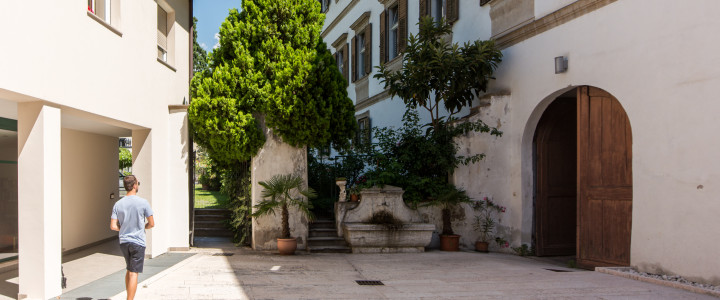PhD programmes at unibz
In the last few years, through our five faculties and research centres, we have invested significantly in implementing and boosting our research activities. We focus a lot on the training of young researchers. Nine well-structured PhD programmes enable them to pursue a career in academia.
Application and admission
Admission to PhD programmes is regulated by a public competition. The selection of the applicants is based on their educational and research background, linguistic competence, possibly on written tests, and an interview.
More information and application portal:
Detailed information, the calls and the access to the application portal can be found on the respective PhD programme page:
More information and application portal:
International PhD students
Our PhD programmes offer a globally renowned academic environment with access to cutting-edge research and expert faculty. International students can benefit from diverse perspectives, cross-cultural collaborations, and networking opportunities, fostering a rich academic and personal experience.
Structure
The courses offered by unibz are full-time PhD programmes. The teaching and research plan is well-structured, and it involves a research trip abroad of at least three months. The minimum length of a doctorate is three years. Students can write their PhD dissertations in English, Italian or German. Under exceptional circumstances, theses can also be written in other languages.
Scholarships and financial help
For most of our PhDs, unibz funds scholarships of €28,000 per year (including tax). For research periods abroad, funding can increase up to 50%. Other research activities (conferences, research trips, Summer Schools, etc.) are funded through individually allocated travel bursaries.
PON fundings positions
Axis 4 "Education and Research for Recovery - REACT-EU", included in the NOP Research and Innovation 2014-2020, contains two new actions intended for PhD programs addressed to the entire national territory and fully financed by additional ESF REACT-EU resources.
The aim is to allocate additional funds to PhDs on innovation and green topics.
The actions are ruled/managed by a ministerial decree. Last update: 15/09/2023
PNRR fundings
Mission 4 'Education and Research' of the National Recovery and Resilience Plan (PNRR) - funded by the European recovery programme NextGenerationEU - provides grants for PhDs.
The objective is to encourage and enhance higher education and postgraduate specialisation, innovating doctoral courses to be promoted also within public administrations and in the field of cultural heritage, thus generating digitisation, innovation and internationalisation processes.
Such funding is subject to ministerial decrees that envisage the possibility of using the grants awarded both to strengthen existing doctoral courses and to set up new ones, either individually or in consortia, including within doctorates of national interest.
By means of Directorial Decrees nos. 1424, 1425, 1426 and 1427 of 26 September 2024, the Ministry of University and Research increased the amount of the ministerial contribution for doctoral scholarships granted by Ministerial Decrees nos. 351 and 352 of 2022 and nos. 117 and 118 of 2023.
unibz will use the additional resources received to support doctoral students with scholarships funded by the PNRR, in accordance with the implementation conditions.
Last update: 02/09/2025
ESF+ fundings
In South Tyrol, the European Structural Funds finance the European Social Fund Plus (ESF+) programme, which aims to overcome structural and social disparities between and within the Member States, thus enabling the European Union to develop in a sustainable and balanced way.
The Priority 2 "Education - Specific objective f)" of the ESF+ programme provides for the financing of measures in the higher education sector: PhDs, Masters, research fellowships and researchers with fixed-term contracts.
This funding is regulated in the call for concrete project proposals to unibz.
Living in South Tyrol
Studying in a place where people go on holiday is a dream for many!
PhD students coming from over 50 countries and registered at unibz thoroughly enjoy their student life, being so lucky to live in one of the most loved tourist destinations in Europe. An exciting cultural life, many leisure activities throughout the year and, finally, the Dolomites – among the UNESCO heritage sites – make studying here a unique experience. Living costs in South Tyrol are comparable to those of many other cities in Northern Italy. Approximately, if you exclude tuition fees, you will need at least €700 per month for living (accommodation, food, study materials, leisure, clothing) in the Bozen-Bolzano area.
Accommodation and Food

You can find adverts to rent a room in a flat-share on
Each campus has a canteen where students can choose their favourite food from a rich menu and pay with their Student Card.
Transport
Students under 27 can buy for €150 an ABO+ student bus pass valid for a year. ABO+ is managed by the local authority Provincia Autonoma di Bolzano. The ABO+ can be used on all public transport in South Tyrol and on regional trains to Trento.
Bozen-Bolzano, Brixen-Bressanone and Bruneck-Brunico - like all South Tyrol - are small towns and, therefore, very suitable for cycling. Classrooms are easy to reach by bike in less than 15 minutes even if you don’t live in town!
Student Associations

Studying is fundamental, but you also have to socialise with other members of the student community. At unibz we have six student associations: SCUB, Pro - Students for Business, k!kero, ESN, the AlumniClub and, on the Brixen-Bressanone campus, Talìa UniLife. The most popular event of the year is the SnowDays, organised by SCUB, which normally attracts more than 600 students, many of whom are registered at partner universities and arrive to South Tyrol for the first time just to attend the event.
Studying barrier free

Students with disabilities who are planning to study at unibz can contact the Student Support to clarify any doubts they may have and ask for information relating to their needs (accessibility of buildings, applications for support, etc.).
Upon request of disabled students, the university can arrange for admission procedures to be customised to meet the needs of each student also by making available any specific technological devices and learning equipment required.
Contacts
Our PhD Service, part of the Study and Tuition service, is the main point of contact for PhD students to get information and support. PhD students can also request an individual guidance appointment for resident permit or other questions.